Mozambique: Almost 300 people rescued from self-proclaimed 'Naparamas' - army
Cabo Delgado war begins to haunt Nampula – Ikweli
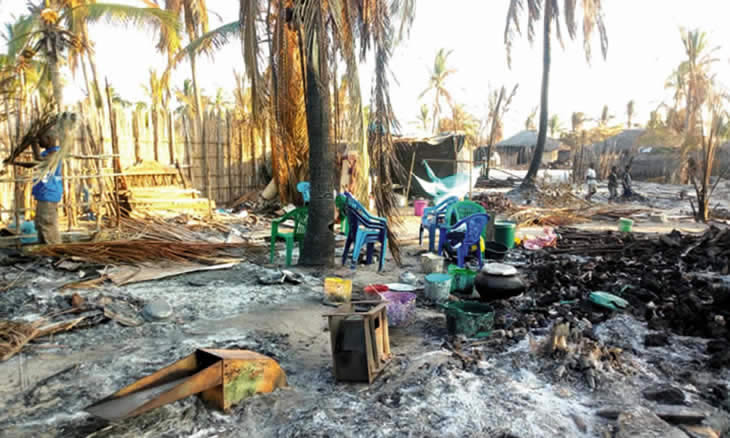
FILE - Village attacked in Cabo Delgado. [File photo: O País]
The armed terrorist conflict which has been ongoing in Cabo Delgado province in northern Mozambique since October 2017 is starting to have an impact on the country’s most populous province, Nampula.
The mass arrival of refugees and the fear that Nampula is a potential recruiting ground for young people is affecting social, political, economic and cultural stability.
The Police of the Republic of Mozambique (PRM) has regularly presented groups of young people who were, allegedly, halted on their way to Cabo Delgado with no clear reason, raising suspicions that they were going there to join the terrorists. For example, in March alone, the PRM stopped at least 77 young people, on their way to the neighbouring province in the midst of an armed conflict.
The then-provincial commander of the PRM in Nampula, Moisés Gueve, said on that occasion that “this group of young people is an example of many others, who are being deceived by individuals of bad faith with promises of employment, while their destiny is in fact to join the ranks of criminals who are destabilising communities in Cabo Delgado”.
The director of the Institute of Social and Economic Studies (IESE), Salvador Forquilha, who is dedicated to research work on armed violence in Cabo Delgado, said, cited by Lusa, that “the insurgency in Cabo Delgado uses Nampula as a recruitment pool”.
Forquilha says the fact that Nampula is a neighbouring province, and the presence of similar forms of Islam and extreme poverty in both provinces, are factors that help explain the recruitment of young people to the armed groups operating in Cabo Delgado.
“Young fishermen from coastal districts of Nampula, living in poverty and at odds with the state, see prospects in migrating to Cabo Delgado, where they end up joining the insurgency,” Forquilha says.
Refuge for families
The common socio-cultural heritage of people in Nampula and Cabo Delgado also contributes to families, victims of terrorist attacks, finding security and a safe haven in the country’s most populous province.
The armed conflict in Cabo Delgado, according to data from various researchers, is estimated to have already taken more than 600 lives, and affected more than 200,000 people.
The districts of Meconta, Nampula, Rapale and Nacarôa are, officially, where most of the refuges from Cabo Delgado are arriving, in search of peace and security and a way to carry on with their lives.
Most people have families in these parts of Nampula, but Ikweli observed that, in some neighbourhoods in the largest urban centre in northern Mozambique, their arrival is affecting the quality of life in the welcoming families and communities, as well as among the refugees themselves, with the households now straining at sustainable capacity.
The trauma resulting from war is obvious. In the neighbourhood of Namiepe, when researching this article, our reporting team was regarded with suspicion, even by children. “Daddy, soldiers!” one boy, not yet three years old, shouted in Maconde when he saw the Ikweli team accompanied by the neighbourhood secretary.
Later, the child’s father, Saíde Abudo, explained: “My son has already absorbed the military’s way of being and walking, so that even when he is playing with friends and sees someone in uniform, perhaps the police, he abandons the game and runs home crying.”
Abudo said that he cannot live in Nampula, because life is different from at home, where, in addition to working as a security guard, he had another profession.
“I dream of continuing to live in my own land, because I am not able to get used to life here. There, in addition to my job as a security guard, I was working as a motorcycle mechanic,” he explained.
Martins Constâncio, also displaced in Namiepe, recalled the horrific things he suffered to get to Nampula. Each story is sadder than the next.
“They received us with open arms, because they know that, in addition to being people like them, we are Mozambican citizens who have fled a war that may or may not hit Nampula,” Constâncio points out.
The ‘Unidade Comunal Marien Nguabi’ , in Namutequeliua neighbourhood, is referred to as the “neighbourhood of the Makonds”, and there, too, many displaced people have settled, mainly because of the ease of communicating in their native language.
“In fact, here we have already received many displaced people, but there is no problem, because the residents here have received them with open arms and they are living together normally. They have had meetings with government personnel,” the chief of one of Marien Nguabi blocks, Rito Gabriel, told Ikweli.
One of the displaced said: “We have not fled to another country, we are here in the same country, and it is good to know that the people here know what we experienced and have received us, to live as the compatriots that we are.”
Everything is missing for the survival of families
Although well received, the displaced families complain of the lack of necessities, especially food, clothing and blankets.
“Since we arrived, we are freezing, because even at night we sleep with the clothes we wear without any blankets, that’s why we asked the government to help us. We have sometimes received food, but it doesn’t last long,” Constâncio says.
Manuel Mbuere, another victim of the terrorist attacks in Cabo Delgado, told Ikweli: “We hope that the government will do something to end the attacks and, when everything is better, we can return to our areas of origin, because it is there where our farms are.”
According to community leader Castro Amade, displaced people still face difficulties, even though they receive support from the local population.
Amade says that the people displaced from Cabo Delgado by the insurgency started arriving in Namiepe at the end of May, and, when he noticed, he sought them out and talked to them. Realising that they had fled the war, he told government officials.
Our reporting team saw families using fires at night to keep warm.
“In fact, to face these difficulties, the government sometimes helps with a basic basket of rice, beans and cooking oil, but, since most of them are living many to one house, sometimes the food is just enough for a week at most, and then they starve again. For example, today [the day we conducted the interview], I delivered to the government the list of more than 30 families that have just arrived and have not yet had support,” Amade reported.
Government promises land for cultivation and housing
The Provincial Delegate of the National Institute for Disaster Management (INGC), in Nampula, Alberto Armando, said that, for as long as the displaced people cannot return to their homes, the Nampula government has identified a space in the Inthuthu area, Administrative Post of Corane, 72 km from the capital of the district of Meconta and 62 from the city of Nampula, where land will be allocated for food production and housing construction.
According to Armando, the location is close to essential services, and a preliminary study indicates that it will be necessary to invest more than 72 million meticais to ensure basic conditions for families.
“Houses will be built with local material at a cost of 60,000 meticais per unit. A similar exercise was also carried out in relation to boreholes, and, in this first phase, two will be opened, which will cost about two million meticais. In the agricultural production area, including necessary instruments and supplies, and seeds, an amount of 7,481 meticais is being estimated for each family,” Armando “Local structures are already raising awareness in the surrounding communities, so that the work can take place smoothly.”
Fear of violence against minors
Officially, it is known that the majority of the displaced are children and women. It is estimated that 53% of the displaced are minors, a fact that worries local government authorities, according to reports presented by the Secretary of State for the province of Nampula, Mety Gondola, in a meeting with the Mozambican Minister of Foreign Affairs and Cooperation, Verónica Macamo, who recently visited Nampula.
“The fact that there are a greater number of children and women calls our attention to the need to ensure that we reduce the potential risk of sexual violence against children, child prostitution, a rise in premature marriages and other ills which may affect them,” Gondola said at the time.
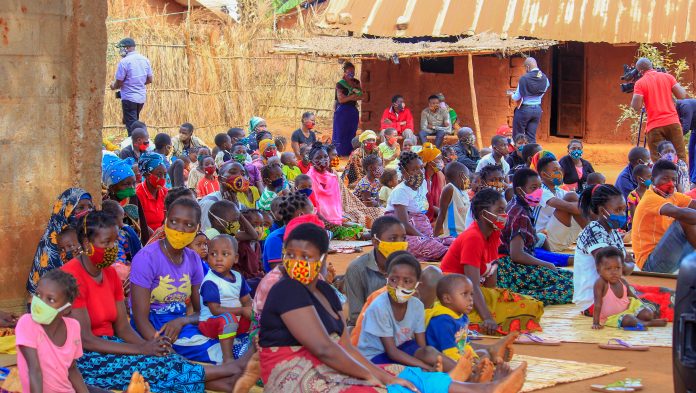
“It is a challenge to prepare the resumption of face-to-face classes and ensure that children can find a learning space, to make sure that they don’t live without basic health care and ensure that vaccination is respected within the space provided and, above all, that there may be a song of hope for each one of them who are living together with the natives, and so that the community in general is not destabilised by the violent attacks that are happening in the neighbouring province of Cabo Delgado,” Gondola said.
There is no risk of ethnic discrepancy
Sociologist Dicson Guilherme says that there is no risk of ethnic discrimination between Mozambicans, pointing out that Cabo Delgado is Mozambique, and all the people in the country are from a single nation.
“The fact that some citizens abandon their habits and customs, not of their own free will, to join another society with different routines, socially will create some transformation, because the attitudes and the environment in Nampula are different, but I think that the ‘Nampulenses’ have a task, which is to receive and welcome these brothers and sisters, because looking at some areas, in a house evaluated for four people, more than ten are living, and this refers to the surrounding people, the need to welcome and support these brothers from Cabo Delgado.
“On the other hand, the Maconde people need to look at their ethnicity, habits and customs, and live together believing that we are in another reality. Probably, people come from a district or a locality far from the capital village of the district, for example, but they are here in the city of Nampula, by the way the most important in the northern area, and this refers to other ways of thinking and being prepared to drink the water that you drink in any society you’re inserted in,” Guilherme said.
Guilherme emphasises the need for some non-governmental organisations to intervene, because, as a sociologist, he thinks that the government does not have the capacity to respond.
“It is necessary to find NGOs that can help the people who are coming from Cabo Delgado morally and materially, and take a very serious form of control with regard to security measures, because people are likely to come to the city of Nampula or some district of the province and get involved in criminal acts. So it is necessary for the government to take care of the message to help people who have been making them part of the normal living of the city, as is the case of Nampula, because life in the countryside must be difficult, and I must believe that these organizations could help to give a boost to the continuity of the lives of the displaced,” he added.
One more problem for Nampula
For the president of the Action Party of the United Movement for Integral Public Salvation (AMUSI), Mário Albino, the situation in Cabo Delgado is a problem for Nampula, because people who move in will change the electoral composition and worsen poverty in the region.
“As we know, the city of Nampula is the capital of the north and it is the poorest in relation to the others in the centre and south, therefore identifying itself with this problem and with the brothers and sisters who arrive from Cabo Delgado fleeing the insurgence, it will further complicate the situation and will worsen poverty, because the population is increasing and the markets where everyone could look to eat while doing business cannot be occupied by many people due to the coronavirus,” Albino says.
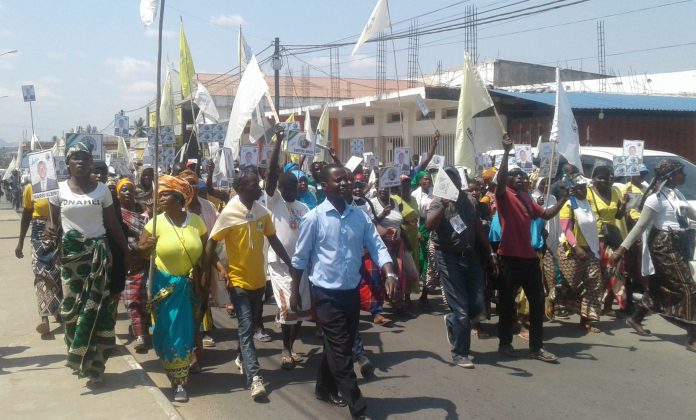
“This is one more challenge for politicians, because the parties will have to work harder to cover the whole of society, and there is also a need to be vigilant because it is not known if in the people who come from Cabo Delgado there are infiltrated perpetrators of terrorist acts in that part of the country, hence the risk of danger to Nampula,” the politician concludes.
The situation must be seen as that of the whole country
During her stay in Nampula, Minister Verónica Macamo also talked about the war displaced, saying: “We must see the case as a situation of aggression against Mozambique that started in Cabo Delgado”, and so the displaced from there must be welcomed as Mozambicans anywhere in the country.
“Those people have to be welcomed anywhere in the country, well cared for and supported, given a place where they can stay and the basic conditions to continue to live and look at life with hope, so we would like to ask all who have embraced and supported this cause to continue doing so. In the same way that we have been working, we must continue, because what this means is to put people in a safe and nourishing place,” Macamo appealed.
By Alfredo Célia



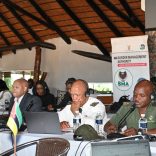
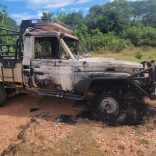

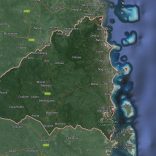






Leave a Reply
Be the First to Comment!
You must be logged in to post a comment.
You must be logged in to post a comment.